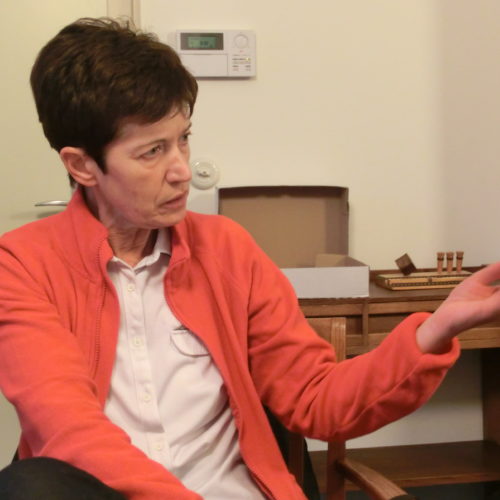Debate on Deglobalization
The neoliberal world market-project has failed
25th of May, 2020

Alexandra Strickner
In the face of the corona crisis, almost every country is desperately trying to buy protective equipment, masks and medicine on the world market. Today, most of the production of these medical items is limited to a few places in Asia. Intergovernmental cooperation in production and procurement is currently in short supply – a disgraceful credential for global governance. The motto “My country first!” applies, sometimes at the expense of others. The initial lack of cooperation between EU countries has now been replaced by an EU export ban on a number of medical products. This is particularly bad for countries of the global south, which have so far imported these goods from the EU.
The Corona Pandemic shows: The neoliberal world market project has failed. It not only endangers our climate, it endangers lives of human beings. Over the last three decades and with the help of trade and investment agreements, the EU has massively pushed this project forward for the benefit of EU companies. The production of essential goods has thus increasingly shifted into the hands of a few corporations operating in “low-cost” countries. For the companies, the conditions in these countries are “favourable” because of very low wages, hardly existing labour rights and environmental regulations and tax advantages.
Two sides of the coin
For a few corporations, the world trade flows and profits have grown steadily – that is one side of the coin. The other side is marked by social cuts, the destruction of local supply structures for essential goods and the worsening of the climate crisis. In favor of a few and the expense of many, a vulnerable, unstable economy has been created.
Not so long ago, conservative and neo-liberal politicians ignored or delegitimised our criticism of the effects of radical market trade agreements. Now, during the crisis, they suddenly talk about how vital products such as protective equipment and medicines need to be produced in Europe or in their own country again. Austrian Minister of Economic Affairs Margarete Schramböck is propagating this in the same manner as German Health Minister Jens Spahn and many others. We will keep an eye on ensuring that these words are followed by action once the crisis is over.
Solidarity and cooperation
For one thing is clear: a world market where those with enough money can buy everything while the others do not have enough to live on is unethical, socially inefficient and unstable in the long term. A world market which aggravates the climate crisis through unbridled transport of goods on a daily basis and increases the power of transnational corporations, is harmful for all of us. We need a regionalised economy of short distances more than ever. The production of essential goods must be organised as locally or regionally as possible – in the sense of the macro-region Europe or Asia, for example. All service sectors covering basic essentials of life must be excluded from all trade agreements. Our everyday economy – the local supply of e.g. food, bank services etc. and the infrastructure of services of general interest (water, energy, health, education, telecommunications, refuse collection) needs to be oriented towards the common good and must be democratically organised and controlled. Trade and investment agreements must be restructured in such a way that the production of these goods and the provision of these services is possible according to these principles. World trade must then be based on complementary products and cooperation. The name of this approach is Glocalisation; a concept that Attac already presented in 2010.
There are already examples of new forms of international solidarity and cooperation: Cuba and China are now sending doctors to Italy, Nicaragua, Jamaica, Argentina and Surinam to help these countries to overcome the crisis. Cities and municipalities around the world are cooperating in areas such as climate protection measures or in receiving refugees. And many social movements, trade unions and civil society initiatives are organising themselves in international networks, for example in the fight for climate protection measures, the maintenance and expansion of public services or for a different trade policy.
New rules of the game
The EU must therefore stop all ongoing negotiations for further neoliberal trade and investment agreements. Now is the time to restructure trade relations on the basis of a new economic concept, focusing on the good life for all.
We now need different framework conditions and new multilateral rules for trade; we need investments and financial markets that ensure the production of high-quality essential goods and services for all people, climate protection and the protection of our livelihoods. We need a different kind of globalisation and a new multilateralism for a good life for all.
Alexandra Strickner
Political Economist, Institute for Multi-level Governance and Development, WU
Co-Founder of Attac Austria
Co-Initiator of the Stop-GATS & Stop-TTIP Platform in Austria
as well as the Anders Handeln Platform (www.anders-handeln.at)
Read the other essays on Deglobalization here:

Anna Ząbkowicz, Maciej Kassner
Deglobalization and EU

Heiner Flassbeck
Neo-liberalism and Globalization

Andreas Nölke
Deglobalization as a cornerstone of a new phase of organized capitalism

Kurt Bayer
Does the Covid-19 crisis lead the EU towards Deglobalization?

Andreas Novy
Globalization was Planned, Deglobalization was not.

Rainer Land
Return to a societally steered market economy

Judith Dellheim
Three Theses for our Debate on Deglobalization

Michele Cangiani
What kind of Deglobalization?








